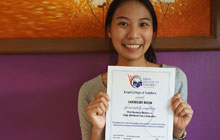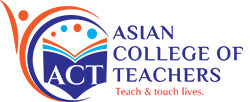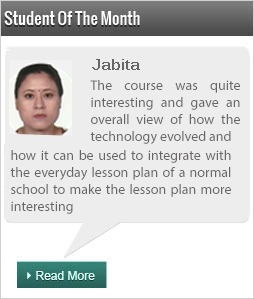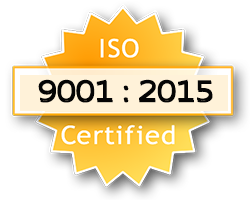Tesol Diploma Course (distance)

TEFL or TESOL is a broad umbrella term for any teaching or training context with regard to English. Teaching English jobs could mean teaching young learners in regular schools, secondary classes, or teaching in language schools both young learners and adults, teaching voice and accent classes, or training corporate clients or teaching business English to adults or soft skill training groups. But for any jobs teaching English abroad an essential qualification is the TEFL course. The Diploma in distance mode covers nearly all of the above related English teaching jobs. The diploma program covers all the components of a regular TEFL course along with the Research module which takes the learning to a higher level and then it tops it off with a specialization in either Business English or Teaching Young Learner program. This specialization gives the teacher an unbeatable edge over the others. All this can be achieved through the Diploma Distance program from the convenience of one’s home or place of residence. The candidate does not have to move to the study location nor terminate his/her job or other commitments to pursue this program. The distance mode of learning makes it convenient to study at one’s own pace and time.
The Diploma in TESOL is a qualification that has a higher value and thereby gives the teacher an opportunity to apply and acquire the best jobs teaching English abroad. The successful completion of the program can allow the teacher to teach any level of English. This TEFL course is best suited for senior and experienced teachers or for those who want to move from teaching in schools to the corporate world or the other way around. Teaching for long can lead to teacher burnt out. It is important that teachers make an effort to further their learning with continuous professional development. The Diploma TEFL course is perfect for teachers who are already in this profession and is looking for some growth and career up gradation
The Diploma program is a bit intensive teachers training program as it is of 220 hours. The teachers are trained in all components of TESOL and a choice in specialization course is given to them. Business English Teachers Training Course and Young Learners Teachers Training Course are the two specialization courses offered to the candidates.
TEFL or TESOL is a broad umbrella term for any teaching or training context with regard to English. Teaching English jobs could mean teaching young learners in regular schools, secondary classes, or teaching in language schools both young learners and adults, teaching voice and accent classes, or training corporate clients or teaching business English to adults or soft skill training groups. But for any jobs teaching English abroad an essential qualification is the TEFL course. The Diploma in distance mode covers nearly all of the above related English teaching jobs. The diploma program covers all the components of a regular TEFL course along with the Research module which takes the learning to a higher level and then it tops it off with a specialization in either Business English or Teaching Young Learner program. This specialization gives the teacher an unbeatable edge over the others. All this can be achieved through the Diploma Distance program from the convenience of one’s home or place of residence. The candidate does not have to move to the study location nor terminate his/her job or other commitments to pursue this program. The distance mode of learning makes it convenient to study at one’s own pace and time.
The Diploma in TESOL is a qualification that has a higher value and thereby gives the teacher an opportunity to apply and acquire the best jobs teaching English abroad. The successful completion of the program can allow the teacher to teach any level of English. This TEFL course is best suited for senior and experienced teachers or for those who want to move from teaching in schools to the corporate world or the other way around. Teaching for long can lead to teacher burnt out. It is important that teachers make an effort to further their learning with continuous professional development. The Diploma TEFL course is perfect for teachers who are already in this profession and is looking for some growth and career up gradation.
The Diploma program is a bit intensive teachers training program as it is of 220 hours. The teachers are trained in all components of TESOL and a choice in specialization course is given to them. Business English Teachers Training Course and Young Learners Teachers Training Course are the two specialization courses offered to the candidates.
TEFL Diploma Distance Syllabus covers the following components
Module 1 - Introduction to TESOL
Language Acquisition
- Second Language Acquisition
- Acquisition Vs Learning
EFL teaching
- Methodologies and Approaches
Learners
- Language Learners and their levels
Module 2 - The Study of English
Grammar
- The structures
- Contextualizing Grammar
Phonology
- Segmental
- Supra-segmental
Teaching Vocabulary
Module 3 - Teaching Techniques (Language Skills)
Part I
- Teaching speaking
- Teaching Listening
- Teaching reading
- Teaching writing
Part II
- Context and Language Modeling
- Communicative ways
Module 4 -
Classroom Management
- The components
Disaster Management
- Mixed and large groups
Module 5 - Lesson Planning
- Guidelines
- Format
- Samples
Module 6 – Need Based language Teaching
- EAP
- ESP
- Business Communication
Module 7 – Teaching Young Learners
- Difference between Adults and YL
- Different orientation
- Songs, Rhymes, Stories and games
Module 8 – Text books and Materials
- Evaluating Text books
- Types and use of Materials
Module 9 – Research and Self Study
The Business English – Professional Skills
Module I - Introduction to Business English – features and components
- The Learner
- The teaching context
- The trainer
- The language
- Communication techniques
- Communicative Language teaching
MODULE II - Need Analysis
- Need analysis - categories and modes
- Decision Making
- Communication needs
- Business needs
MODULE III - Course Design
- Setting objectives
- Syllabus components
- Designing
- Implementing
- Setting up the independent ongoing learning plan
- Managing the logistics
MODULE IV - The Client Approach
- Introduction - Adult, personal and professional
- Present yourself professionally -differing "roles" for the teacher – e.g. coach, consultant facilitator
- Methods of empowering learners
Midterm Assignment
MODULE V - Feedback and Evaluation
- Different types
- Assessing the trainees
MODULE VI - Classroom Management
- Creating rapport – sensitivity to needs
- Modeling instructions
- Creating interactive activity
- Varying activities
- Being a facilitator
MODULE VII - Teaching Business Speaking
- Business communication related to socialization
- Skill practice variants - the different methods
MODULE VIII - Teaching Business Writing
- Technicalities of Business Writing
- The basic business writing - types and approaches to training writing
Young Learners Teachers Training Curriculum
Module 1:
Language learning and language acquisition
- The Hypothesis
- The Difference between learning and acquisition
- Assignment
How do children learn English
- Practical approaches to teaching children
- The levels
- Language Development and context
- Assignment
Module 2:
Teaching Listening
- The importance of listening in the classroom
- Listening activities
- Self - Assignment
Teaching Speaking
- Speaking in the classroom
- Student talk
- Introducing language
- Activities
- Self – Assignment
Teaching Reading
- Approaches to reading
- Building confidence
- Different Material
- Assignment
Teaching Writing
- Pre writing tasks
- Activities
- Some more ideas
- Assignment
Module 3:
How to handle mixed groups
- Mixed groups
- Helpful strategies
- Group work
- Assignment
Class Management
- The teacher
- The room
- Rules
- Working in groups
- Self-Assignment – not to be submitted
Lesson Planning
- The need to plan
- Different ways of planning
- The framework
- When things go wrong
- Assignment
Module 4:
Materials in the classroom
- Things to make
- Things to buy
- Assignment
Stories, games, songs, chants
- How to use stories
- Games – some ideas
- The importance of songs and chants
- Self-Assignments – not to be submitted
Module 5:
Correction techniques
- Look at error differently
- Ways of error correction
- Assignment
Evaluation techniques
- The meaning
- Purpose
- Formative assessment
- The continuous system
- Assignment
Language is a skill and it is acquired and retained in meaningful context. The TEFL teacher training gives the teachers the skills and knowledge to contextualize language teaching and therefore be prepared for English teaching jobs abroad and all over the world. The Communicative Language Teaching is the base of all TEFL courses. However teachers need to be aware of the needs of their learners and model their teaching accordingly. The needs, interests and levels of the learners vary vastly. Therefore the Diploma Program specialization module caters to the specific teaching context. One would not teach young learners the same way as one would teach adults.
The Young Learner course prepares the teachers for an interactive and high energy class. It is designed for teachers who are willing to teach young children in schools. The YL course of Asian College of Teachers contains 5 modules and it is the ideal way to prepare oneself with the tools and techniques of teaching young children whose attention span is limited and style of learning is very different from that of an adult. The YL course informs students about the various methodologies of language learning and acquisition and teaches them with practical application of theories in real YL class. The YL teachers need to know the mind and the learning ability of their students for their lessons to be effective in class; and the YL course of Asian College of Teachers equips its students with the right tools for the job. The Asian College of Teachers 's methodology being primarily focused on teaching how to apply one's knowledge in class and make learning fun and exciting is very proactive and enhances the creative skills of the students.
On the other hand the Business English program is an ESP class and demands a different method and approach. It prepares the business English teacher to conduct effective need Analysis, design curriculum and evaluate return on investment. The BETT course includes needs analysis or how to correctly identify the needs of your clients and tailor a course that would best suit them. The course equips teachers with the skill to customize the materials available in the market for efficient in class teaching. The course covers all aspects of Business English teaching and prepares the candidate to effectively teach adult professionals using appropriate lesson models and learning tools. They also learn about the types of evaluation and the most effective style of giving feedback.
The BETT or Business English Teacher Training course has 8 modules and at the end of each module assignments are given that need to be completed and submitted within a stipulated time. A teacher who has successfully completed TEFL Diploma course with specialization in BETT would have excellent job prospects as corporate trainers.
A methodology is effective only when it has practical application and the Diploma TEFL methodologies are just that. The focus here is on making language applicable and practical. Present day teaching is not about delivering lectures and mouthing theories it is about providing trainees with a practical teaching experience. Asian College of Teachers ' endeavor is to do exactly that- prepare the teacher with strategies to plan lessons efficiently for every level - and conduct classes with ease and confidence.
The TEFL Diploma course is definitely a comprehensive teacher training program and thereby requires more time. The full duration of the program is 220 hours or 12 months. However since the course is in distance mode it depends on how much time one would allocate for study. The maximum time limit provided to the candidates for the TEFL Diploma Program is just 11-12 months. The candidates can complete the course within 4-5 months if they devote more time towards the course.
The phases or assignments have no fixed time frame for completion. However the course needs to be completed in the stipulated time provided during registration. This gives the students ample time and scope to pursue a professional TEFL course in how to teach English from the convenience of the home and at a much affordable cost. Keeping in mind that sometimes unforeseen and unprecedented circumstances can delay even the best laid out plans we do allow grace period in certain cases. However the candidate has to intimate the course coordinator in advance about the delay. All decisions regarding the same rest with the course administration.
Asian College of Teachers offers international teacher training courses at very affordable process. The TEFL Diploma Program is actually comprises three courses at the price of one. It has the TEFL certificate course, the Diploma course and the Young learner or BETT course at only Rs 28,000/-.
A certificate dispatch fee of 25 USD is charged for certificate dispatch to the students residing out of India.
+18% GST
Asian College of Teachers has been providing quality teacher training courses for nearly a decade. Our teachers are teaching all across the world. The Diploma TEFL certificate from Asian College of Teachers therefore holds a lot of value and opens doors to jobs teaching English abroad njo0t only in regular schools but also in language institutes, communicate English departments at university and colleges, exam classes as well as in the corporate sectors.
- Certificates are accrediated by TESOL Canada
- Option to seat for TESOL Canada Board Exam
- Certificate can be Notarized, Apostille, Attested by Embassy of India in Ottawa or Washington
- Certificates can be signed and sealed by UAE Embassy in USA or Canada
- Certificates can be authenticated by Canada -Ministry of Foreign Affairs
- Certificates can be authenticated by USA - department of Foreign Affairs













